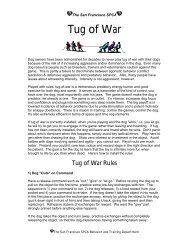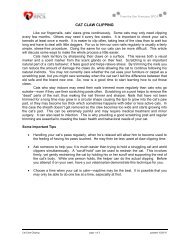Kitten Kindergarten - San Francisco SPCA
Kitten Kindergarten - San Francisco SPCA
Kitten Kindergarten - San Francisco SPCA
Create successful ePaper yourself
Turn your PDF publications into a flip-book with our unique Google optimized e-Paper software.
medications, many cleaning solutions and anti-freeze are also very poisonous to cats. These must all<br />
be put away where the kitten cannot get at them - and they do have agile little paws. You can use<br />
cupboard latches used to baby-proof kitchens to keep your kitten away from these items.<br />
Keeping Your <strong>Kitten</strong> Indoors:<br />
Indoor cats live longer, healthier lives than those who are allowed to go<br />
outdoors. Just as responsible parents do not let their children play in the<br />
street, responsible pet guardians don’t allow their pets to, either. Feline<br />
Leukemia (FELV) and Feline Immunodeficiency Virus (FIV) are two<br />
major illnesses contracted through contact with other cats. Cats<br />
involved in fights with other cats, dogs, raccoons, or other animals<br />
often are badly injured, and require expensive medical care.<br />
Additionally, many cats are lost forever, too frightened to find their way<br />
home, and may even starve to death. And, although some folks<br />
believe it, cats are not “street smart”. A car means little to a cat, and<br />
they do not instinctively know to run from one. A cat-proof enclosure in<br />
your back yard can allow your cat some safe, outdoors time.<br />
Regardless, even in the safest of situations, kittens should never be let<br />
outside until over the age of 6 months, and only if they have had all the<br />
appropriate shots.<br />
Preventing Escapes:<br />
<strong>Kitten</strong>s can move quickly, and they may be tempted to dart out your<br />
door if given the chance. First of all, make sure not to leave your doors to<br />
the outside open for longer than necessary for you to get in or out! This is<br />
something that needs to be discussed with all members of an active<br />
household (such as a multi-roommate situation, or a home with children<br />
or children who visit often) so everyone understands the danger of<br />
escape. Cats and kittens are easily frightened and overwhelmed when<br />
out of their safe territory, and may panic and hide, or worse, bolt into the<br />
street.<br />
Establish an area away from the door as your “Goodbye and Greeting<br />
Zone.” Before you leave, and when you get home, give your cat a treat<br />
in this area.<br />
Entertaining:<br />
Until your kitten is acclimated and comfortable in the house, large parties, or noisy groups of people<br />
will just frighten him. If you do plan a gathering, it is best to confine the kitten to one room, with food,<br />
water, litter box and toys, and perhaps bring guests, (a few at a time), to meet him. Holidays are<br />
particularly stressful for many cats as are fireworks - your kitten might want to hide then. We do not<br />
recommend adopting a kitten during holidays - they, and you, will have a better chance of settling in<br />
when it is quiet and stable in your home.<br />
Page 3 of 7
















